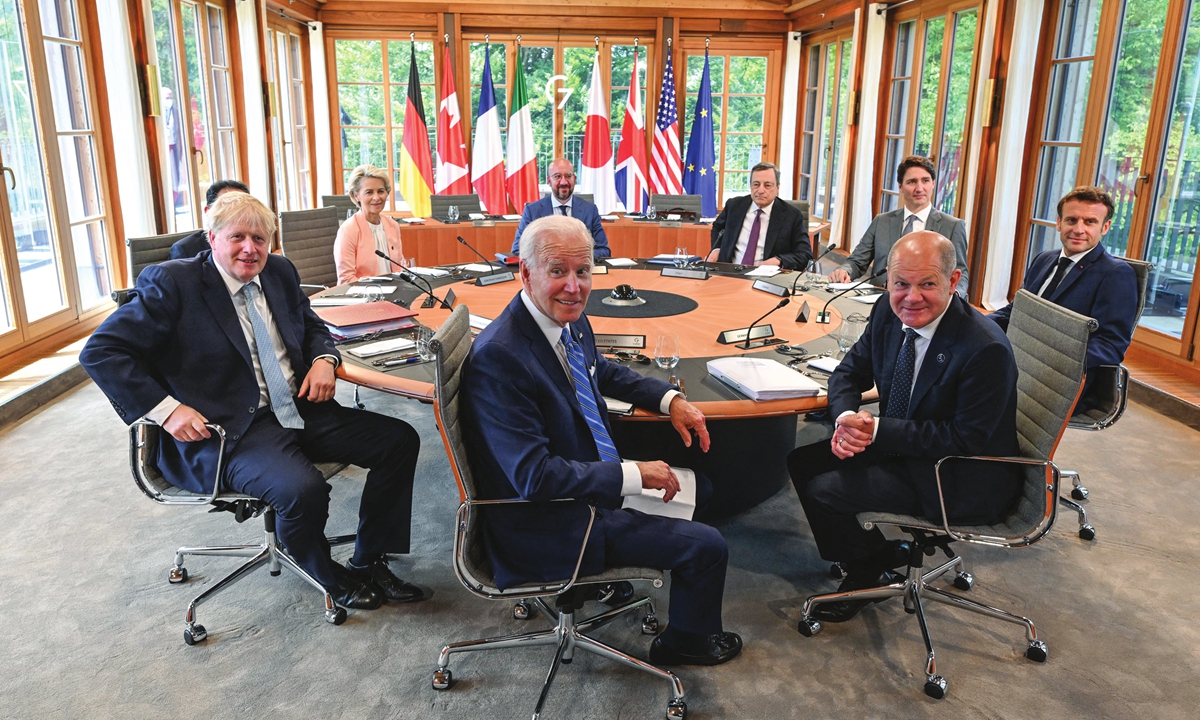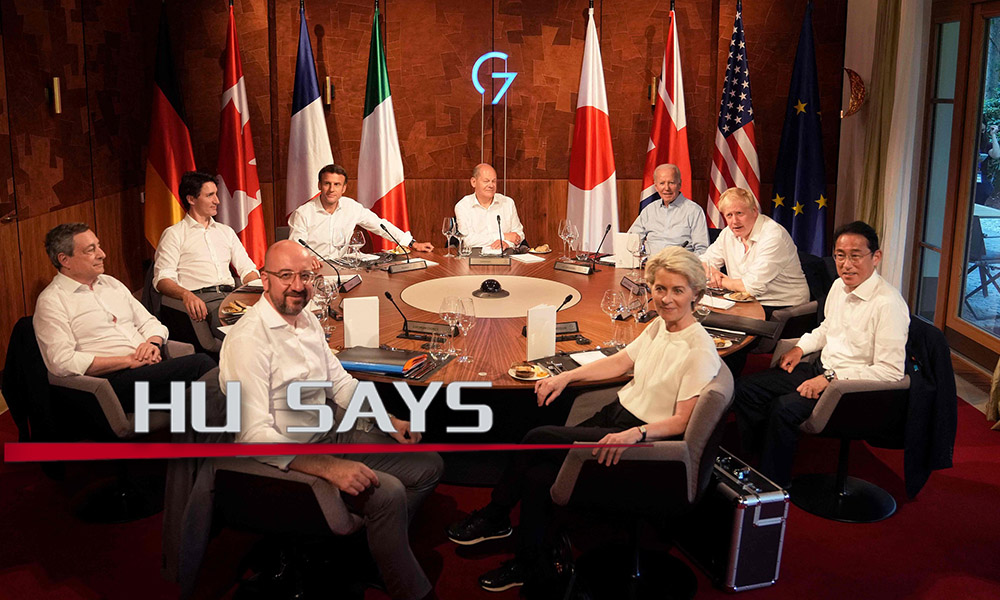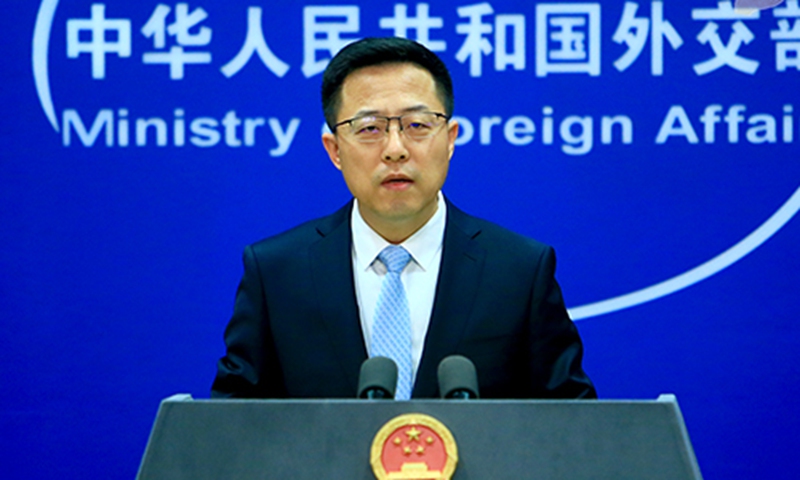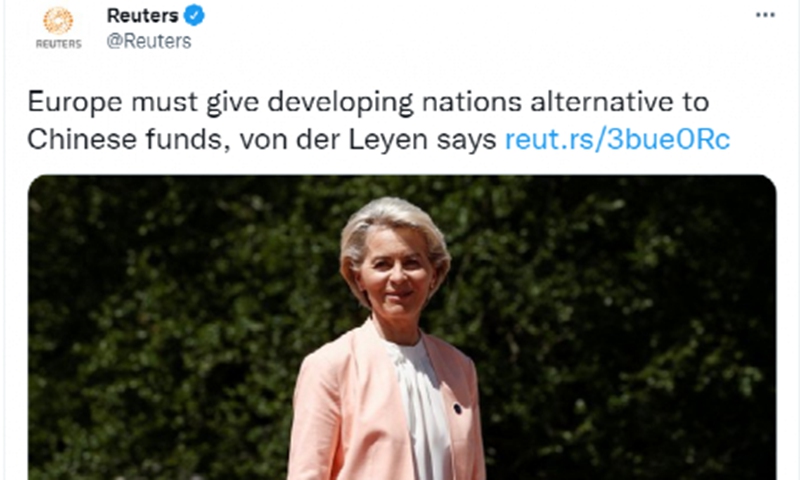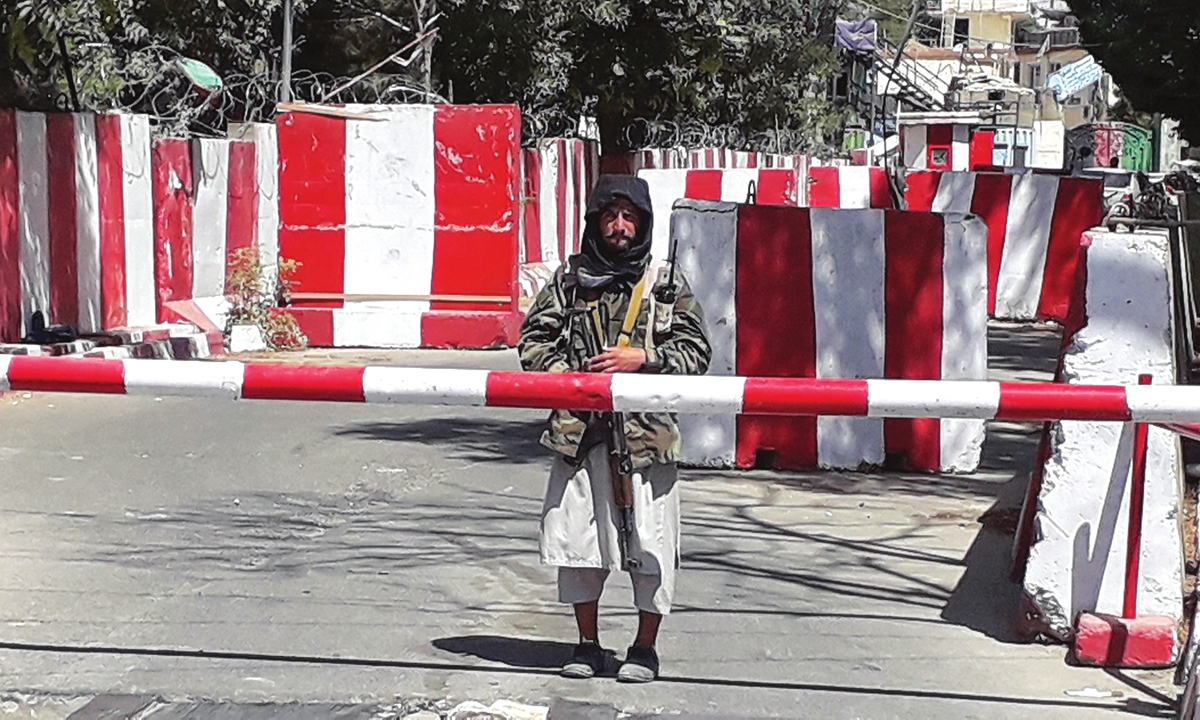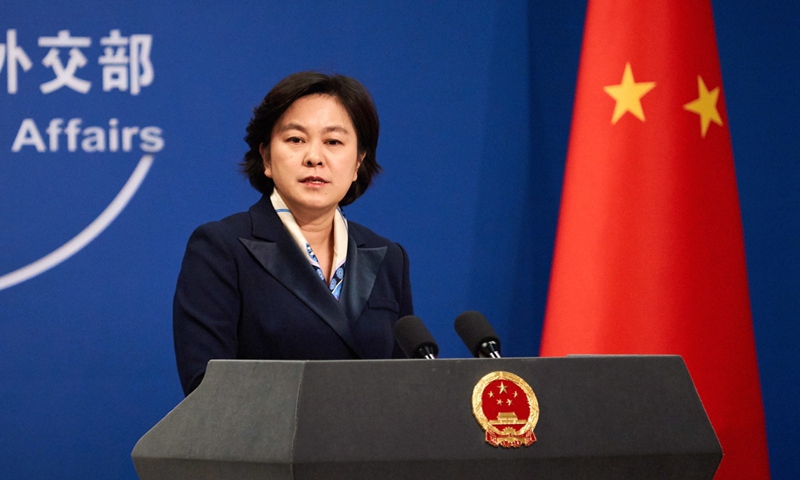Share This
Sunday, 26 October 2025
Mass Protests Erupt in Malaysia as Trump Faces Outrage Over Gaza at ASEAN Summit
Tuesday, 28 June 2022
G7 to raise US$600bil PGII to counter China’s initiative met with skepticism, mockery
G7 summit: Is western influence waning in a multipolar world?

Top shots: Leaders of the G7 at the gathering in southern Germany. Biden and other leaders relaunched the newly renamed “Partnership for Global Infrastructure and Investment” at the annual event. — AFP
G7 summit is more like a Western mobilization meeting for US diplomatic strategy
G7’s $600 billion PGII met with skepticism, mockery
US' program eyes geopolitics; 'objective impure'

After US president Joe Biden and leaders from other Group of Seven (G7) nations proposed to raise $600 billion in the next five years to finance infrastructure projects in developing countries, a move generally interpreted by observers as intending to counter China's Belt and Road Initiative (BRI), economists expressed skepticism over the feasibility of such a program, citing reasons such as the US' strained government debt status, poor infrastructure construction abilities and past failure with a similar project. They also criticized the G7 proposal for having an "insincere" intention, as it was raised more from the perspective of launching a political competition with China, instead of really caring about the infrastructure situations in lower income countries. In this sense, it is unlikely to yield any project that could compare with China's flagship BRI projects, which focus on mutual connectivity, win-win, not decoupling and exclusionism. Government leaders from Group of Seven nations made a pledge on Sunday at their annual gathering to raise $600 billion in private and public funds over the next five years to finance infrastructure in developing countries, in a project called the Partnership for Global Infrastructure and Investment (PGII), a Reuters report noted on Monday. US president Joe Biden said that the US aims to mobilize $200 billion for the PGII project over the period through grants, federal funds and private investment to support projects that help tackle climate change, improve global health, digital infrastructure and gender equity. He highlighted several flagship projects, including a $2 billion solar development project in Angola, the report noted. Europe will mobilize 300 billion euros for the initiative, Reuters said. On the sidelines of the G7 Leaders' Summit in Germany, Biden said that the PGII is not aid or charity, but will "deliver returns for everyone", including the American people, according to a report by npr.org on Sunday. The G7 nations launched the PGII project only about one year after a very similar scheme was unveiled at the G7 conference last July. The scheme, named Build Back Better World, commonly known as B3W, is considered by many media outlets as a predecessor to the PGII. UK newspaper The Guardian, for example, used the word "relaunch" to imply that PGII is just a disguised version of B3W. Insincere intention Although the US government didn't explicitly mention the relationship between PGII and the China-proposed BRI program, many media outlets including Reuters as well as economists mentioned that the real intention of PGII is to counter China's BRI which has delivered many concrete projects since it was proposed in 2013. Hu Qimu, chief research fellow at the Beijing-based Sinosteel Economic Research Institute, said that China's global infrastructure cooperation has continued to yield results in recent years, standing in sharp contrast to some Western governments' "dereliction of duty" in this area. "The PGII is like a shouted slogan to ring-fence China's strategies, a kind of tactic to create an atmosphere of cracking down on China," Hu said, adding that it could also be a method used by Biden to pander to voters ahead of the US mid-term elections. Another international relations expert who requested anonymity also said that the US, which has no tradition of helping other countries in the field of infrastructure, would not suddenly change and take to the idea. "The real intent is to counter China's projects and compete with China," the person said. Observers found that the PGII's two pillars of clean energy and information/communications technology are particularly hostile to China, as the West has been smearing China over issues related to the solar power industry in Xinjiang and China's 5G technology, using security concerns as an excuse. Commenting on this policy direction, experts criticized the US-led program for lacking the sincerity of really caring about the infrastructure situations in developing countries, saying instead that it had a very "impure" objective. "If the G7 group only targets China's overseas infrastructure market for competition, history will prove that this kind of top-level planning that lacks the concept of common development will only become another short-lived project," Wang Jianjiao, director of the economic and trade cooperation department under the Silk Road Academy of Social Sciences, told the Global Times on Monday. Wang also noted that only when the US gives up its global cooperation model, which often attaches "unequal additional conditions", gets rid of its own debt predicament and reinvigorates the US' real economy will it have a chance of competing with China in overseas infrastructure markets. Unfeasible project Economists also noted that the PGII and its promised funding volume by the US government is never likely to become reality, considering the US' internal economic problems and unstable political situation. Qiu Wenxu, director of the industry development department under the Silk Road Academy of Social Sciences, said that if the US government really intends to materialize the $200 billion funding, it is unlikely to come mostly from private capital, as infrastructure projects have long investment cycles and relatively low yield rates, making them unattractive to private investors. "However, at the current time when the US' government debt is at a critically high level and it has hardly any budget to invest in foreign-bound infrastructure, Biden still needs to raise most of the money from private companies. In this sense, it's very likely that the $200 billion fund can't be raised to the full number," Qiu told the Global Times on Monday. He further stressed that the US does not have advantages in infrastructure construction, pointing out that it has hardly completed any large infrastructure projects in its own country in the past 10 years, not to mention abroad. For example, California's high-speed rail, a flagship US infrastructure project, is "tens of billions of dollars over budget and years behind schedule," according to a report by kqed.org in May. Some experts also noted that the US' changing political situation is also casting uncertainties over implementation of the funding. "It would be even more difficult to convince the US Congress to invest overseas, if after the midterm elections the Democrats lose the majority of House of Representatives," Lü Xiang, an expert on US studies and research fellow at the Chinese Academy of Social Sciences, told the Global Times, on Monday. In fact, analysts have pointed out that the PGII funding would in fact add liability to Biden's already poor approval rating in the US, given the much weakened domestic economy due to galloping inflation, among other social issues. The difficulties in raising funds for such a project were already shown in the PGII's predecessor project B3W, which some media outlets and people regarded as a failure. An article by Foreign Affairs, for example, said that the B3W project has " languished", while a Guardian report noted that "little had been heard of" B3W since its launch. According to the Foreign Affairs article, the US' commitments to global infrastructure renewal only came to about $6 million under the B3W project in one year after its launch, which is "a far cry" from the billions Biden promised at the beginning. "Judging from the B3W implementation, it has high probability that the PGII will be another empty promise," Qiu said. BRI success to continue Economists also said that even with competition and certain countries' attempts to smear the BRI, the benefits and achievements of BRI is obvious to all, and that BRI investment will likely continue to surge in the future regardless of the volatile global political situation. Chinese Foreign Ministry Spokesperson Zhao Lijian said on Monday that China welcomes any initiative to promote global construction of infrastructure. "We believe that one initiative is not meant to replace another. However, we oppose the act of using the name of infrastructure to promote geopolitical schemes," he said. Liang Haiming, dean of the Belt and Road Institute at Hainan University, also told the Global Times that even if Western countries loan money to developing countries to build infrastructure projects, China might benefit from such a program, as many countries would purchase China's construction materials as they are known for being cost effective. Qiu also said that China's BRI has become one of the largest international cooperation platforms in past years, as the country does not view infrastructure construction projects as the ultimate purpose, but aims to help countries consolidate economic development foundations by improving their infrastructure construction.
In the first five months, China's non-financial foreign direct investment in countries along the BRI route rose 10.2 percent to about $8.2 billion, data from the Ministry of Commerce showed.
Aiming to keep pressure on Russia and seek solidarity to cope with challenges from so-called systemic rival China, ...
To a certain extent, all Western countries have gained strategic benefits from the China-US competition. Meanwhile, Washington has ...
A spokesperson for China’s Foreign Ministry on Monday refuted G7 officials’ claims of “debt trap” created by the ...
EC President von der Leyen roasted for anti-China agenda in new infrastructure funding initiative
Related posts:
US loses focus by inserting anti-China in infrastructure plan
Belt-road changes world order
Prospering with Belt and Road to reap the benefits of China's initiative
Asian Infrastructure Investment Bank, opens to lay down milestone for global economic governance
Connected by mountains and waters
NATO’s expansion stumbles as members calculate costs
U.S.-backed smear campaign created 'debt trap' narrative to defame BRI
Thursday, 19 August 2021
Taliban's rapid victory embarrasses US, smashes image, arrogance
China respects Afghans' choice, urges Taliban to implement commitments
`
Afghans' distrust of US reflects the fact that the entire world ...
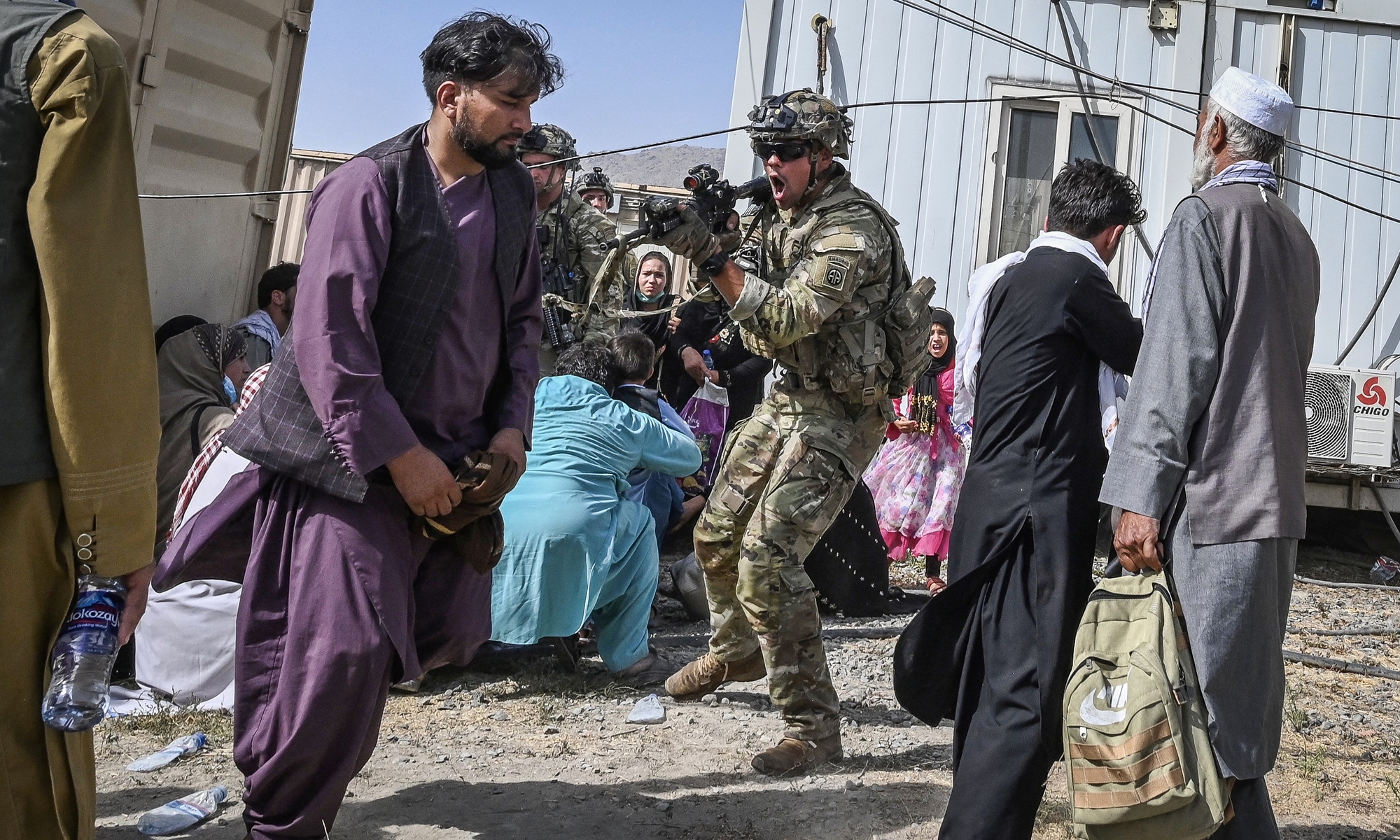
A US soldier (center) points his gun at an Afghan passenger at Kabul airport on Monday as thousands of people mobbed the city's airport trying to flee the country. Photo: AFP
The Afghan Taliban have successfully returned to Kabul and are ready to set up a new government while the hasty US retreat, which had caused deaths to locals, makes the end of the 20-year-long war look increasingly embarrassing to the US..
`
The UN Security Council held an emergency meeting to discuss the situation in Afghanistan on Monday..
`
Before the Security Council meeting, key US allies including the UK and France who fought the war with the US in the past two decades had expressed their disappointment and concerns, but China and Russia remain calm and cautious in observing the situation..
`
Chinese analysts said to what extent the Taliban could win worldwide recognition depends on how it could implement its commitments, and the failure in Afghanistan could deeply damage the US image as a hegemon.. But the pullout from Afghanistan would make the US bolster its presence in other regions..
`
Washington is still able to export chaos to other countries and regions with the excuse of "values, international orders or human rights" and people worldwide should learn from the current situation in Afghanistan, experts noted..
`
China to be cautious.
`
"China has noticed that the Afghan Taliban said yesterday the war was over, and they vowed to establish through negotiations an open and inclusive Islamic government, and to take responsible actions to ensure the safety of Afghan people and foreign diplomatic personnel," Chinese Ministry of Foreign Affairs spokesperson Hua Chunying said at a Monday news conference. .
`
Jin Canrong, associate dean of the School of International Studies at the Renmin University of China, told the Global Times on Monday that "China needs to stay calm to observe the current situation, because the Taliban have gained an unexpected victory. This does not mean the Taliban have had overwhelming military power to ensure control, but the [Afghan] government's force has lost morale and given up.".
`
The Taliban need to take political responsibility, but considering there are different forces within the Taliban, how to prevent the struggle for power and keep an internal balance, as well as satisfy local tribal forces would be the new challenges for the Taliban, and the risk of chaos still exists, Jin said..
`
Pan Guang, a senior expert on counter-terrorism and Afghan studies at the Shanghai Academy of Social Sciences, said that the possibility of a humanitarian crisis is there and if the Taliban failed to restore peace and order, the UN Security Council would have to consider sending UN peacekeeping troops into the region, not just to prevent the country becoming a breeding ground for terrorism, but also to conduct anti-drug missions and other humanitarian work. .
`
"But this needs all five permanent members of the Security Council to be united," Pan noted..
`
Zhu Yongbiao, director of the Center for Afghanistan Studies in Lanzhou University, said the Afghan Taliban's success in Afghanistan is difficult to duplicate elsewhere, but some terrorist and extremist militia forces in the region, such as the Taliban Movement in Pakistan, as well as the Islamic Movement of Uzbekistan, and even ISIS in the Middle East, might believe that they would have the similar chance too..
`
"China and Russia, as well as other partners in the region and under the Shanghai Cooperation Organization, are paying attention to the situation to prevent the potential spillover and to strengthen border controls," he noted..
`
Reactions from major powers.
`
Russia was in contact with Taliban officials through its embassy in Kabul, President Vladimir Putin's special representative on Afghanistan said on Monday, a day after the Afghan government collapsed and the capital fell to the Taliban, Reuters reported..
`
Russian Foreign Ministry spokeswoman Maria Zakharova also pointed out that there has been no reaction from Washington to human rights violations in Kabul and the appeals of Afghan citizens for evacuation help at Kabul airport, TASS reported on Monday..
`
The West shows a totally different image compared to those of China and Russia. "World leaders blame Biden, and express disappointment with Afghanistan." This is the headline of a report from Fox News on Monday, as it has listed the negative comments on the US failure from the leaders of some Western major countries, including UK Prime Minister Boris Johnson. .
`
Johnson told Sky News that it was "fair to say the US decision to pull out has accelerated things, but this has in many ways been a chronicle of an event foretold." He urged Western leaders to work together to prevent Afghanistan from again becoming a "breeding ground for terrorism." French President Emmanuel Macron was scheduled to speak on Monday about the situation, while France also sent military aircraft to evacuate its nationals from the country..
`
The different attitudes between the West and non-Western major powers prove that those who closely followed the US in the Afghan war have felt the pain and shared the US feeling of failure. But China and Russia, which didn't follow the military actions, could be more flexible to deal with the dramatic change, Zhu said..
`
The Xinhua News Agency published on Monday a commentary entitled, "The 'fall of Kabul' rings the funeral bell of US hegemony." .
`
The article said the US can simply leave but it has left Afghan people with endless pain. In the past 20 years, more than 30,000 civilians had been killed directly or indirectly by US forces, and more than 60,000 had been injured, with 11 million refugees. This proves that the US is the biggest exporter of chaos in the world, and its hegemony has caused too many tragedies. .
`
Chinese experts said the end of the war in Afghanistan has deeply damaged the image of the US as a hegemon, and in the future, if the US decides to launch military actions elsewhere with the excuse of "democracy, values, human rights or rules-based order," very few countries would keep following it, or they would just send very few troops to reluctantly fulfill the relevant alliance treaty..
`
"But when the US withdrew from Vietnam in 1970s, it pulled itself out of a mess, which gave it more resources to do more in other regions. So the US global influence remains powerful," Xiao He, an expert from the Institute of World Economics and Politics under the Chinese Academy of Social Sciences, told the Global Times on Monday..
`
Experts warned that Washington is still able to export chaos by force,, and the world still needs to stay alert, and learn from the current situation in Afghanistan..
`
Source link`
The Taliban were in control of Afghanistan on Monday after President Ashraf Ghani fled the country and conceded ...
China hopes that the Taliban can implement its previous commitments and ensure a smooth transition of power in ...
Several European countries have decided to evacuate diplomats, citizens from Afghanistan and close embassies there as Taliban members ..
Related posts:

